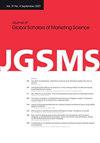Let’s not talk about men: When meaningful female-to-female interaction and dialogue drive higher box office sales
IF 2.7
Q3 BUSINESS
Journal of Global Scholars of Marketing Science
Pub Date : 2023-11-06
DOI:10.1080/21639159.2023.2248758
引用次数: 0
Abstract
ABSTRACTThis study explores two unique aspects of diversity, equity, and inclusion (DEI) from the perspective of gender diversity in the field of motion pictures and the dimension of inclusion utilizing the Bechdel-Wallace Test (BWT). A production may pass the BWT if a conversation between two women is not about men, hence the conversation is deemed meaningful. Using a consumer-driven data set, we find a positive effect of the BWT on international and total box office sales. The results also show a unique result in the years following the modern #MeToo movement, leading to enhanced box office returns for domestic, international, and total box office sales. Therefore, in addition to contributing to efforts to better understanding the impact of the addition of gender diversity and inclusion on motion picture performance, female characters’ meaningful conversation with other females will likely lead to higher return on producers’ investment in motion pictures. Practical implications and contributions to feminist film theory and theory of planned behavior are discussed.KEYWORDS: Bechdel-Wallace testdiversitybox office revenueMeToo movementsocial justice Disclosure statementNo potential conflict of interest was reported by the author(s).让我们不要谈论男性:当有意义的女性与女性的互动和对话推动更高的票房收入
摘要本研究利用贝克德尔-华莱士检验(Bechdel-Wallace Test, BWT)从电影领域的性别多样性和包容维度两方面探讨了多样性、公平和包容(DEI)的两个独特方面。如果两个女人之间的对话不是关于男人的,那么一个作品就可以通过BWT,因此这个对话被认为是有意义的。使用消费者驱动的数据集,我们发现BWT对国际和总票房销售有积极影响。该结果还显示了现代#MeToo运动之后几年的独特结果,导致国内,国际和总票房收入增加。因此,除了有助于更好地理解增加性别多样性和包容性对电影表现的影响外,女性角色与其他女性进行有意义的对话可能会给制片人带来更高的电影投资回报。讨论了女性主义电影理论和计划行为理论的现实意义和贡献。关键词:贝克勒斯-华莱士试验多样性票房收入同性恋运动社会正义披露声明作者未报告潜在的利益冲突。
本文章由计算机程序翻译,如有差异,请以英文原文为准。
求助全文
约1分钟内获得全文
求助全文

 求助内容:
求助内容: 应助结果提醒方式:
应助结果提醒方式:


